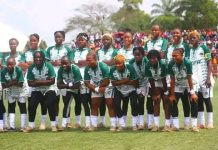Africa-Press – Liberia. A consultative process intended to stimulate an inclusive society and government dialogue gets underway today in Monrovia with many international and national dignitaries expected to grace the occasion.
Known as the Stockholm +50 national consultations, the occasion, according to organizers, will focus on how to ensure Liberia’s natural resources are managed for posterity and prosperity — with a premium expected to be placed on the environment and sustainable resource management.
The State Secretary to the Swedish Minister for International Development Cooperation, Jenny Ohlsson, is due in-country to grace the occasion, a Swedish Embassy’s media advisory disclosed Thursday.
She will hold high-level meetings with the government and various stakeholders. “On her agenda is also the launch of the Stockholm +50 national consultations on how to ensure Liberia’s natural resources are managed for posterity and prosperity,” the embassy said.
A critical concern for the Swedish diplomat is the issue of climate change. Stockholm+50 is an international meeting convened by the United Nations General Assembly to be held in Stockholm, Sweden from 2-3 June 2022.
It will commemorate the 50 years since the 1972 United Nations Conference on the Human Environment, which made the environment a pressing global issue for the first time.
Some 122 countries attended, and participants adopted a series of principles on the environment, including the Stockholm Declaration and Action Plan for the Human Environment.
The United Nations Environment Program was created as a result of the conference. Minister of Foreign Affairs, Dee-Maxwell Saah Kemayah, is expected to launch the national consultations at the Monrovia City Hall today.
“Liberia’s Pro-poor Agenda for Prosperity and Development contributes to sustainable development by acknowledging the importance of climate change also to economic and social development.
Its aspiration to improve the sustainable management of Liberia’s natural resources is commendable,” the advisory quotes Ms. Ohlsson as saying. “Sweden supports Liberia’s aspirations to protect its people from the effects of climate change through various climate adaptation and mitigation measures.
”
The Stockholm +50 conference, themed “a healthy planet for the prosperity of all – our responsibility, our opportunity”, comes at a critical time when countries worldwide are grappling with the Earth’s triple crises – the climate emergency, unprecedented socio-economic impacts of COVID-19 that have wiped off key development gains, and continued degradation of natural ecosystems and biodiversity.
Liberia is a critical partner in the global fight against climate change. Home to more than 40 percent of the Upper Guinea Rainforest as well as a huge number of endemic and endangered species, some of which are only unique to the country, Liberia’s forest is essential to helping reduce higher global temperatures.
“Forests are like giant lungs that absorb harmful gasses in the atmosphere that are causing global warming,” former EPA Executive Director, Anyaa Vohiri said at a climate change conference in 2016.
The country faces enormous challenges despite the huge tract of forest it possesses. The forest sector came under the spotlight in the private use permit (PUP) Scandal of 2012.
Considered as one of the biggest conspiracies to hit the forestland sector since the civil crisis, officials of the FDA connived with logging companies and private landowners to abuse the forest through logging activities.
Farmers are cutting down the forests for their farms and killing the animals in the forest for food. Protecting the wildlife and plants – known as “biodiversity” – in the forests is essential to keeping the forests alive.
The activities of multinational agriculture companies, especially palm plantations, and logging companies, have added to forest destruction. The Land Rights Act of 2018, which was hailed as a milestone as it would give locals more voice in the governance of their forests and lands, is doing little to prevent another countrywide crisis.
The challenges abound despite Liberia’s pledge to conserve 30 percent of its forest as part of its commitment to the 2015 international climate change accord, known as the “Paris Agreement”.
Agriculture production and sustainable management of natural resources are pillars of the Weah-led government’s Pro-Poor Agenda for Prosperity and Development.
In November 2021 at COP 26 in Glasgow, President George Manneh Weah called for fair and equitable distribution of climate financing—noting that countries with rich forest and biodiversity are the ones benefiting the least from the existing solutions and financial arrangements intended to tackle climate change.
Although President Weah wants more financial support to countries with rich forests, there are concerns that his government is doing very little to address forest illegalities such as the illegal timber extraction being carried out by the representative.
Meanwhile, this year marks 50 years since the first United Nations Conference on the Environment, held in Stockholm, where the inextricable linkage between the environment and poverty was established, laying the foundation for sustainable development.
Liberia’s Environmental Protection Agency, in collaboration with UNDP, will organize a series of national, regional and thematic consultations, bringing together policymakers, technical experts, youth, women, civil society, private sector and other stakeholders to address some of these concerns.
The consultations, according to organizers, will lead to the development of the country’s environmental management plan ahead of the June Stockholm +50 conference.
The Liberian government has however welcomed the Swedish top official to the country. “The Government of Liberia is pleased to host Ms Ohlsson, whose visit speaks of our cordial and fruitful partnership with the Government of Sweden.
Sweden and UNDP have long been great friends of Liberia, and I am pleased to see this collaboration with the Government to help strengthen our country’s environmental systems and ensure that our people can benefit from our country’s rich natural resources,” the advisory quotes Foreign Minister Kemayah as saying.
“Liberia’s nationally determined contributions were bold and ambitious pledges to reduce emissions of greenhouse gases responsible for global warming, and to strengthen adaptation to climate change.
Our goal as UNDP is to work with partners to help Liberia turn these commitments into concrete actions that will eradicate poverty and unemployment while protecting the country’s environmental resources,” says Stephen Rodriques, UNDP’s Resident Representative in Liberia.
For More News And Analysis About Liberia Follow Africa-Press






